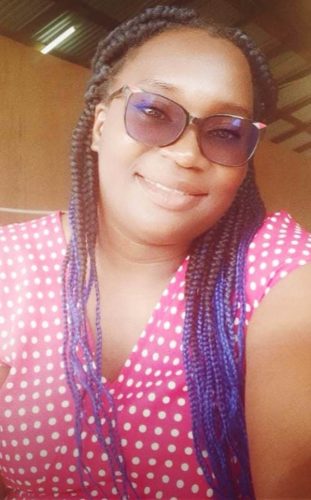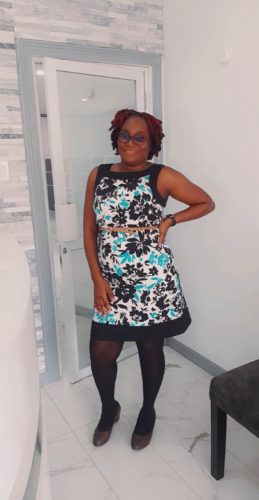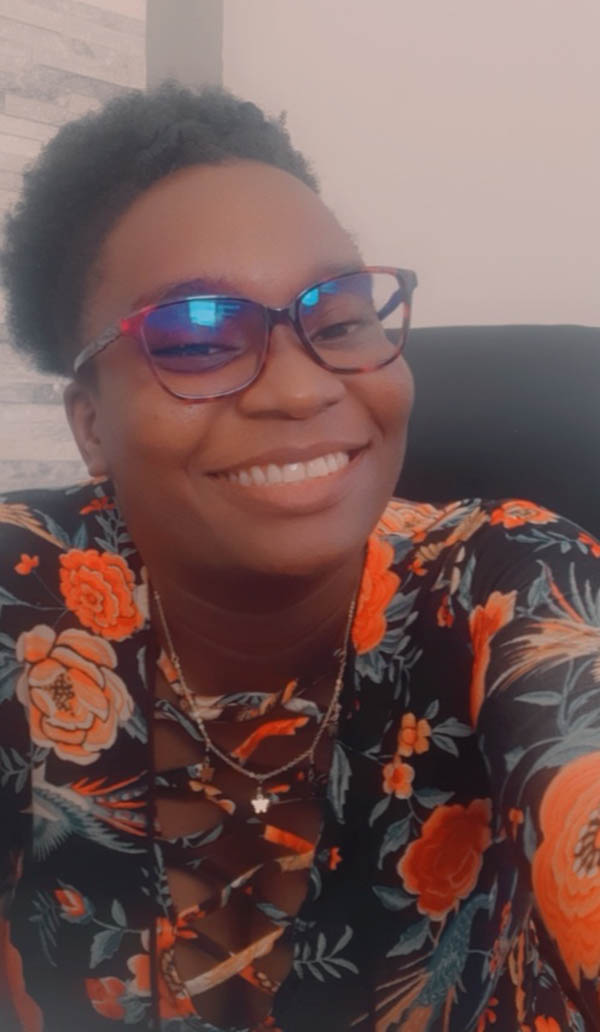“My name is Mandesa Williams and I am HIV positive.” It took ten years for 30-year-old Mandesa Williams to say those words publicly and now that she has revealed her status to the world, the mother of two is on a mission to make the journey of HIV+ Guyanese one where they do not have to live in perpetual fear of being outed.
While she revealed her status on a Facebook live recently, ending ten years of denial, when Williams spoke with Stabroek News it was not about being positive; she revealed that being a teenager, bringing forth her rapist’s child and enduring years of domestic violence all contributed to her attempting to take her life on more than one occasion.

“I was not prepared to talk about all of this…,” she said, as she incrementally revealed parts of her past, struggling at times to vocalise some of the horrible experiences.
The adults in her life failed her as a child but Williams said it was not about blaming as “forgiveness played an important part in my healing”. She added that in order to move on she had to make “conscious decisions [as] forgiveness is very much needed not for the other persons but for myself.”
Williams was asked if she wanted to remain anonymous in this interview, but quickly responded in the negative. “I revealed it on Facebook live and I don’t want to be anonymous. I want to put face to HIV,” she said.
Williams found out her status when her previous place of employment, the Guyana Prison Service, held a campaign encouraging employees to be tested. Since it was being done at the worksite she joined the line.
“I did the test and a few minutes after they told me that I tested positive… just like that,” she recalled. “I was outside and after the test they called me in and they told me I am HIV+ and they gave me a contact number to contact them. I think probably because it was a work environment they didn’t want to keep me in there too long.
“Honestly I didn’t feel any kind of emotion or anything. I just felt numb and that was so for a couple of years. I was just numb. I was struggling to accept that was the case.” She walked away and returned to work.
At the time she was living with her two children and that evening when she returned home she recalled, “I was just numb, I didn’t think about it”. She also did not shed any tears. “I cried years after,” she shared.
She told no one of her positive status. Pretending that it wasn’t so, she continued living as per norm. A while after, however, she met someone who later became her husband and he encouraged her to visit a treatment site.
“Even though I was on this medication – I went to clinic and everything – now I am thinking I pretended well. Because even though I was on this medication it was hard for me to accept I had HIV. It was hard to have discussions about HIV but I was taking the medication,” she related.
Her then husband (they eventually separated, not because of her status but other issues) was her biggest support and he never revealed her status to anyone.
Accepted fully
Williams said it was only early last year (almost nine years after she tested positive) that she fully accepted her diagnosis and could discuss the issue.
Prior, she recalled, when she attended the clinic, she had just one or two word answers for the counsellors, as all she wanted was the medication so she could leave.
She did not reveal her status to many, Williams said, but people somehow “heard” and it was “a tough journey” as some would approach her to avail themselves as confidants, while others would discriminate against her.
“Persons would come and say it is true? I heard this, or they would even go as far as if they see someone close to me and they don’t even know the relationship, they would meet that person and say things like ‘You know that girl is a living dead…’.” she said.
She did not reveal her status to any of her family members and she said for years she was in and out of depression. During those periods she attempted to take her life many times. After one of those attempts, her mother was contacted and accompanied her to the hospital where her status was revealed.
“She found out that I was positive and we never had that conversation after. I think she didn’t know how to comfort me and because we never had this close relationship.
I am thinking she didn’t know how to approach me. Even now we never had that conversation. When I went live a few weeks ago, she was saying ‘I am proud of you, congratulations’ whatever, but yet we never had that conversation,” she disclosed.
Early last year she had the conversation with her children, whose ages are 14 and 10. She realised that her children were becoming older and she did not want them to hear from anyone else as “the gossip was all over”, she said. They both were very accepting and that was all she needed.

“At that moment, that was all the support I needed. The people that I care about the most, if they can accept me, definitely I can accept myself,” she said.
It was that conversation with her offspring that helped Williams to not only accept herself, but choose to speak publicly about her status.
Williams said she knew who transmitted the virus to her and when she confronted him he did not act surprised, but rather wanted to continue to have a relationship with her. “He didn’t deny but he didn’t say yes it was him,” she related.
Williams said there are still too many myths surrounding HIV and AIDS and she hopes her advocacy would help to dispel some of these. She believes there is a need for continuous programmes about HIV and not just around World AIDS Day, which is observed on December 1 annually.
Since going public, Williams said, she has not received one negative comment.
She has since created a WhatsApp group for people living with HIV and they have reached out to her from “near and far. Persons tell me that they were at the lowest and you know listening to me has helped…,” she said.
‘It has been a journey’
Williams, who was a teenage mother, said she was not prepared for it and “it has been quite a journey”. She was in second form when she became pregnant with her daughter and felt she did not have the support she needed. She did not disclose that it was her second pregnancy during the interview, but later messaged to say: “Also, I was so afraid I would break down so I never mentioned I had an abortion at 13 or 14 years before I got pregnant for the second time with my daughter and for years it haunted me. I heard baby cries everyday, everywhere I go. I felt so guilty but over time I’ve comforted myself saying I’m not responsible because I was only a child. A child that needed guidance and love.”
She clearly could not have had the abortion on her own but pointed no fingers, preferring to say she was failed.
“And you know it was rape. Yeah I know it was rape anyway, but it is not like even then I was liking him or anything. He was bigger than me and he just raped me. I never wanted it…,” she struggled to explain.
During her pregnancy, Williams said, she lived between her mother and her rapist’s family, adding that her mother wanted her to have an abortion but by then the pregnancy was too far advanced.
“It was stress at home. So I was back and forth,” she said.
Her second child is for the same man. She shared that it was an abusive relationship. During the years they were together, “it was he telling me when to go, when to come, who to talk to,” she recalled. “He didn’t want me to go back to school. He didn’t want me to have friends, and he didn’t want me to go to church…”
She obeyed him for years but when she became pregnant with her son she decided she had enough and left.
Williams related that the man physically, verbally, emotionally and sexually abused her. “I felt like a sex slave to him. He did whatever he wanted to and even though we’ve separated for many years it played a critical part in my other relationships because I hated sex so much. I would be okay at times then my partner and I would be romancing or making love and something reminds me of him and I would start to panic and resent my partner. And still a day like today I don’t like sex but it’s far better than before,” she shared.
Williams is still not emotionally stable and cries if someone just raises their voice.
“I think I do trust men but I also live on the edge thinking they will mess up and do me the same as he did and it’s very much toxic and maybe the reason I have a hard time keeping a relationship,” she said. “I try very hard to let go of what was and accept what is but it’s easier said than done because he’s left me with permanent scars and trauma.”
The father of her children does not support them. In the past, when she asked for financial support, he wanted to have sexual contact with her before helping his children.
She did not have the conversation about being raped with her children as she still finds it very difficult. Now that they may read it here, Williams said, she will be forced to talk.
On a mission
After leaving the father of her children, Williams attended the New Amsterdam Technical Institute and secured a diploma in secretarial science. She did an accountancy course through another medium. Shortly after she had her son, she moved to Georgetown and joined the prison service.
“The environment was very toxic. It was playing with my mental health,” she said of her former place of employment. Today she is employed in the private sector.
On a mission to bring about change, she has created a Facebook page ‘Voice for the Voiceless’ where she does live videos to educate people about the disease.
On her first live video, many people tuned in and commented, but by the third, the numbers dwindled.
“But I always say even if it is one person at a time, we still heading somewhere. Somebody would tell somebody and there will be change,” she said.
Williams encourages persons to know their status since early detection is key. To those living in denial, she said, “it always helps to talk. Keeping it to yourself wouldn’t help.
“At one time I was so depressed that if my children laughed I would be offended. If they wanted to play it would offend me. If they called me I would be screaming…”
Williams has a partner, who has been very supportive.
She said talking about her status is not for her, but for people who may be in the same situation of denial she was in for years.
“It is my duty to educate persons because probably if I wasn’t in this situation I would have been one of those ignorant persons thinking that this can’t happen…,” she said.
She wants to have a wider platform that includes domestic violence, rape and teenage pregnancy, but said for now it will just be HIV as it is very difficult for her to talk about those aspects of her life.
“I now believe that I am at a stronger place. Because having to go through all these things almost single handedly, my mental health was at rock bottom, but I always managed to bounce back…” she said.
People living with HIV/AIDS who are experiencing difficulties can contact Empire Plus Network formerly the Guyana Community of Women and Girls Living with HIV on 6932817.






